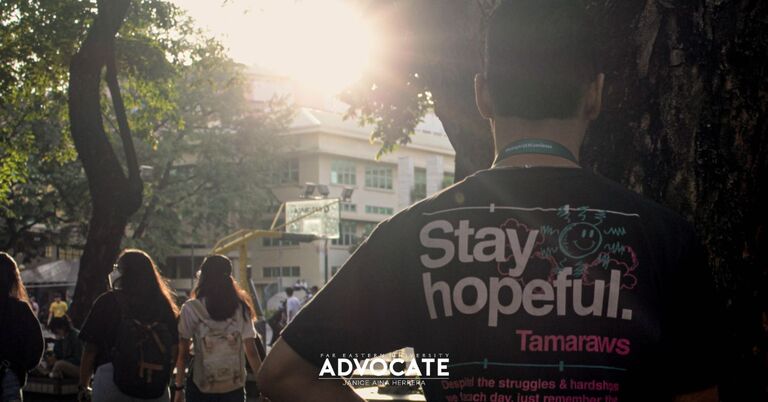
Panaghoy ng Mindoreño: Lumpong Kabuhayan sa Naghihingalong Karagatan
- May 27, 2023 18:47
FEU Advocate
July 27, 2024 15:20

As he concluded his second year, Ferdinand ‘Bongbong’ Marcos Jr. delivered his third State of the Nation Address (SONA) ‘for’ the Filipinos. The president filled it with promises and updates about the country’s progress and development that sounded ‘too good to be true.’ However, the aftermath of the recent typhoon Carina that affected the country already debunked some of his claims. This proves that the real state of the nation says otherwise, contradicting the president’s statements, and leaving other critical issues unaddressed.
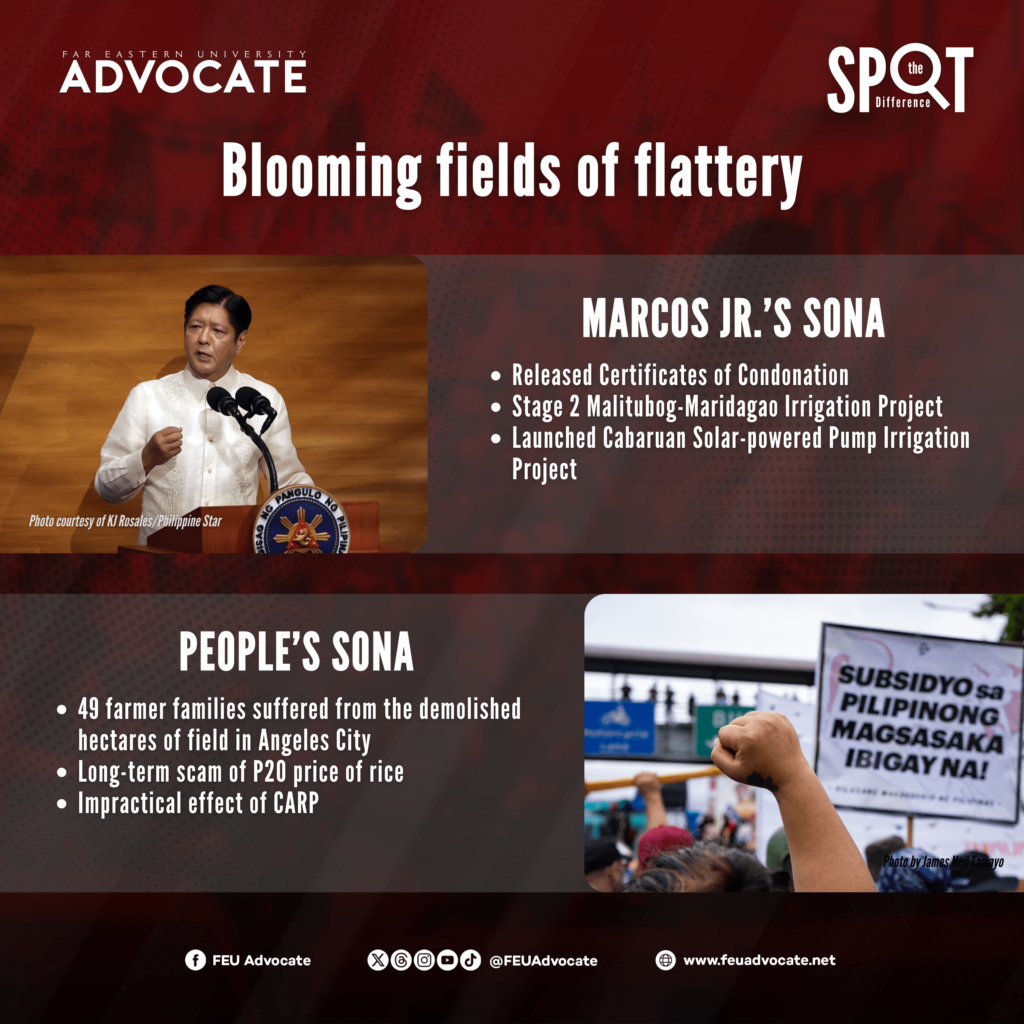
Blooming fields of flattery
In a societal hierarchy, the workers in the agricultural sector, such as farming, fisheries, livestock, and forestry remain to have insufficient support. President Bongbong first tackled the food and water security of the country in his one hour and 22-minute speech.
“Sa nakalipas na dalawang taon, mahigit 130,000 na [titulo] ang ating naigawad sa mga benepisyaryo. Tuloy-tuloy din at pinabibilis pa natin ang paghahati-hati ng mga collective Certificates of Land Ownership Award o CLOA para sa mga indibidwal na benepisyaryo nito (In the past two years, we have given more than one hundred and thirty thousand titles to beneficiaries. We are also continuing and speeding up the distribution of collective Certificates of Land Ownership Award or CLOA for its individual beneficiaries),” he affirmed.
Marcos announced that the Certificates of Condonation were distributed last July 19 to settle the P 70-billion debt of 600,000 beneficiaries.
Afterward, he mentioned that the Malitubog-Maridagao Irrigation Project reached stage two, from which the local irrigators’ associations expect to receive additional income.
The Cabaruan Solar-powered Pump Irrigation Project in Isabela Province was also recently launched to reduce the need for oil as a source of operation.
Amidst these accomplishments, the agricultural workers remain within the silver lining and indigent necessities. It is ironic that the backbone of the society that feeds its country is deprived of the acknowledgment, benefits, and proper solutions for their predicaments.
Moreover, Kilusang Magbubukid ng Pilipinas Peasant Leader Danilo Ramos emphasized that the Republic Act No. 6657 or Comprehensive Agrarian Reform Program (CARP) Law and Agrarian Reform Beneficiaries are impractical for the farmers.
According to Ramos, 49 farmer families in a barangay in Angeles City with 77 hectares of fields were demolished last March despite being CLOA holders and certificate owners of full payment from the Landbank of the Philippines. These reported families are still homeless and perishing in the streets as their livelihood and land are snatched unbeknownst to them.
Aside from these expulsion reports, the promised P20 price for rice remained impossible to achieve with a reality of P55 to P65 price. For two years of Marcos' regime, the agricultural sector struggled to provide proper meals on dining tables.
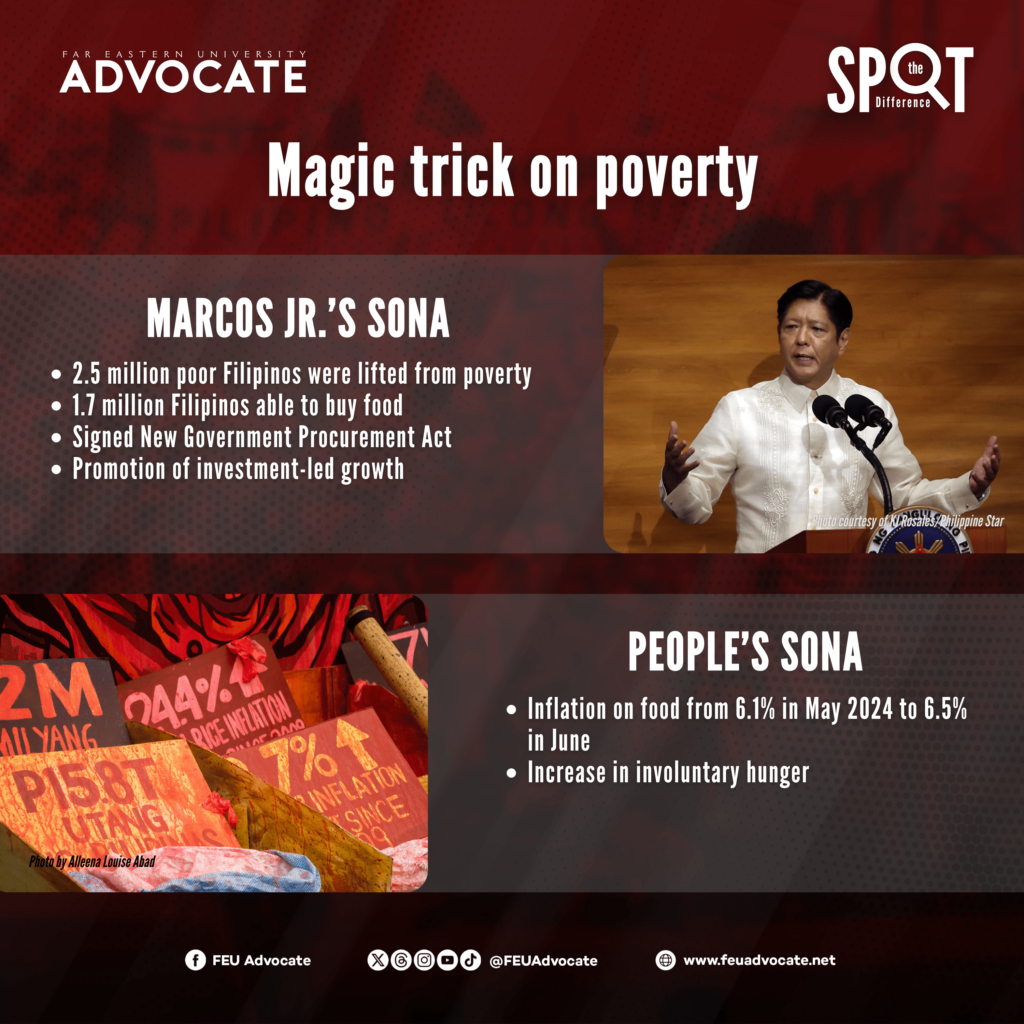
Magic trick on poverty
When price rates ascend, inflation lurks around the market. The country’s economic state can be seen within the strategies to solve inflation on common goods.
Marcos attested that 1.7 million Filipinos were able to buy food. On this claim, he plans to promote ‘investment-led growth’ that builds a beneficial place for businesses and implements ‘green lanes’ which will sustain the country’s economic growth.
This proposed green lane would have 100 projects from a P3-trillion investment. Concerning this proposal, the president firmly said, “The Philippine financial system remains robust and resilient.”
He noted that the poverty rate decreased from 18 percent in 2021 to 15.5 percent.
“Halos 2.5 milyong Pilipino ang naiangat natin mula sa kahirapan (Almost two and a half million Filipinos were lifted from poverty),” Marcos claimed.
Despite uplifting Filipinos to afford basic commodities, the percentage of food inflation climbed from 6.1 percent in May 2024 to 6.5 percent in June, which Marcos failed to acknowledge.
Furthermore, a survey by Social Weather Stations (SWS) unveiled that ‘involuntary hunger’ rose from 12.6 percent in the last quarter of 2023 to 14.2 percent in this year’s first quarter.
This disproportional percentage between the country’s socioeconomic and food security shows that Marcos’ plans for economic growth are like magic tricks where only the royals are entertained.
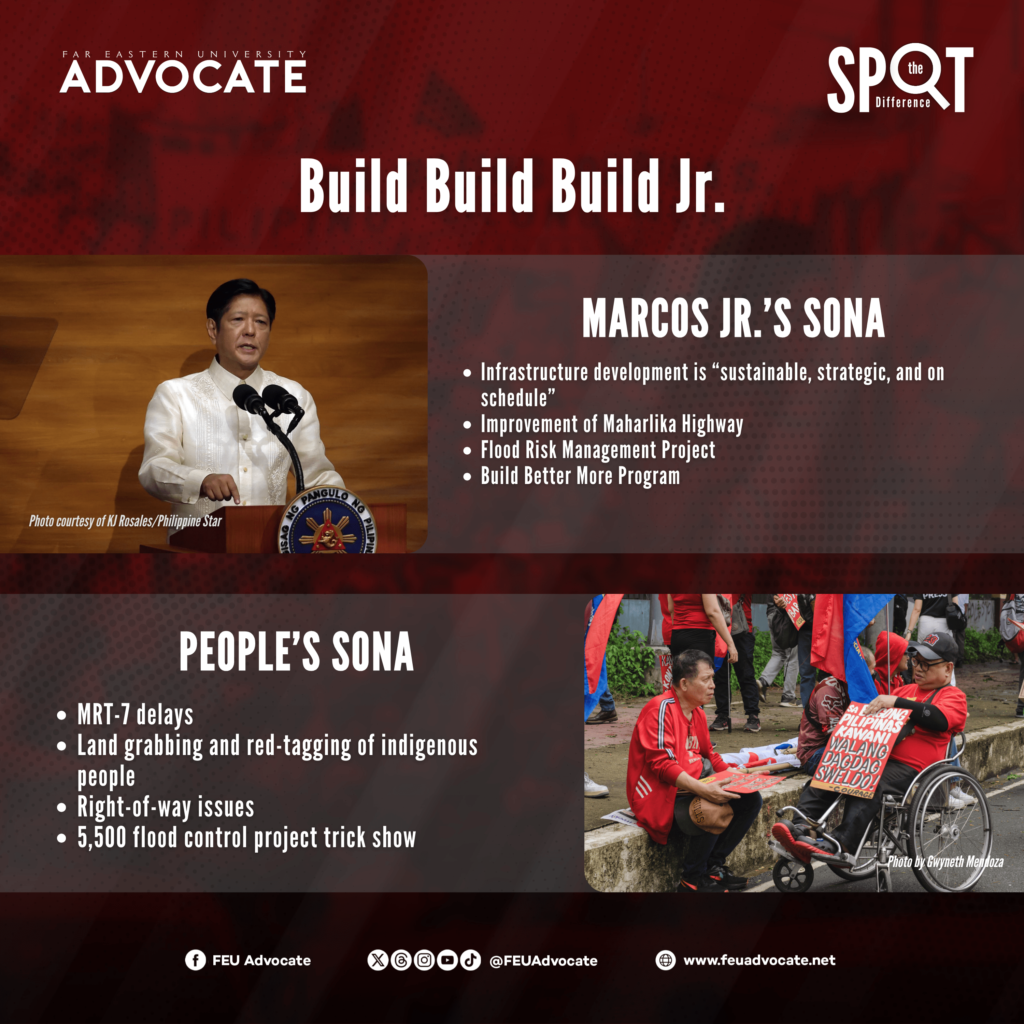
Build Build Build Jr.
The rising of buildings and roads in the country was meant to project the image of the ‘Golden Age of Infrastructure.’ In Marcos' SONA, he claimed that the infrastructure development remains ‘sustained, strategic, and on schedule.’
“We will make sure that right-of-way issues are resolved in the most equitable, efficient, and expeditious manner so that these will not get in the way of our infrastructure development,” the president prompted.
The Maharlika Highway project was provided with a P1.4 billion budget to enhance the distance of the Luzon to Mindanao connection to be completed by March 2025. He also boasted the new increase of trains at LRT-1, new expressways to be expected, and improved airports.
Additionally, the president verified that both the capacity and connectivity of power and internet services were continuously upgraded.
Apart from that, Marcos asserted that in the first two years of his term, 'almost’ 100 evacuation centers have already been built.
The Flood Risk Management Project at Cagayan de Oro River is the president’s flood control project that he said will ensure long-term protection for landfills and citizens around the area.
Despite these mentioned accomplishments and proposed projects, the country’s proper urban planning, long-term solutions, and efficient projects are nowhere to be found.
Marcos claimed that the Public-Private Partnership under the Build Better More Program is ‘on time, sustainable, and sufficient.’ The exchange of displacement of many informal settlers and right-of-way consolidation are still present.
For instance, the MRT-7 was delayed again because of the San Jose del Monte local officials’ request to reroute the railway. The Department of Transportation eyes its completion by 2028.
Additionally, the ancestral lands of Indigenous people are disputed and deprived of the right to oppose these projects. The reports of red tagging indigenous people to intimidate them for fighting on their ancestral domains failed to be acknowledged by the President in his SONA.
Moreover, the recent hit of Super Typhoon Carina in Metro Manila and other neighboring areas experienced severe flooding despite claims there were more than 5,500 flood control projects, yet nothing changed.
These debt-driven projects for a developing country like the Philippines are based on highly ambitious ideas of progress. This almost sweet taste of a progressive nation is not for everyone’s path but for the domain of the privileged ones.

A remedy or a comedy?
Marcos discussed in his speech the health benefits and programs the nation is about to receive in his term.
“Binuksan natin sa publiko ang mahigit 20 Bagong Urgent Care and Ambulatory Services [BUCAS] Centers, sa iba’t ibang lugar sa bansa (We have opened to the public more than twenty Bagong Urgent Care and Ambulatory Services Centers, in different areas of the country),” he said.
The first BUCAS Center was opened in March 2024 at Sto. Tomas, Pampanga, and the Department of Health were eyeing to open 28 primary care centers that will serve the 28 million poorest Filipinos by 2028. Moreover, a few mobile clinics were deployed to remote areas in different provinces this month.
He also discussed the improvements in colon cancer treatment, benefits, and he proclaimed that by the end of the year, treatments for chemotherapy on lung, liver, ovarian, and prostate cancer will be added to PhilHealth benefits.
However, the excess fund transfer of PhilHealth worth P90 billion was not disclosed in his speech last July 22.
National President of Alliance Healthcare Workers Robert Mendoza looked out for the P90-billion fund, which was returned to the National Treasury. This fund is from PhilHealth contributions that can suffice the needs of its members for medical services and healthcare benefits.
Despite these programs and plans for the health sector, the increase in salary for healthcare workers did not make it inside the Senate. In this predicament, Mendoza asserted that healthcare workers are neglected to receive proper benefits and use quality machines in healthcare facilities.
Several medical workers such as nurses wish to migrate abroad rather than serve the country, which leads to brain drain. Nevertheless, it is only a pique of interest when the government’s plans for the health sector are not coherent as a whole, the maneuvers of the sectors were overlooked.
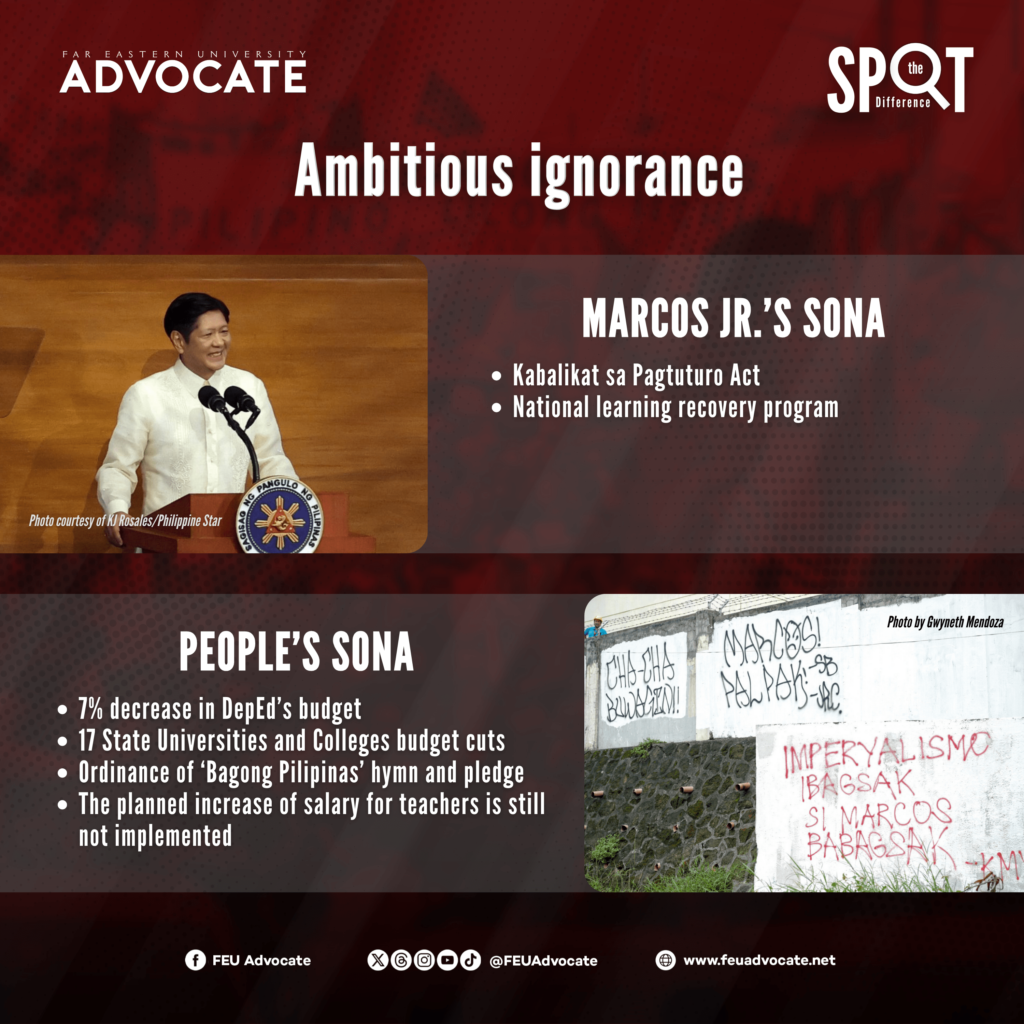
Ambitious ignorance
In his SONA, Marcos deemed the significance of investing in the development of education.
He conceded to the results of proficiency levels that many of grades 6, 10, and 12 students failed to attain, so he is pushing the plan with the national learning recovery program.
The president challenged newly appointed Department of Education Secretary Senator Sonny Angara to recover and increase the country’s quality of education.
Now, Marcos is optimistic to enhance the skills of teachers as he perceives that the quality of education lies upon them. He declared the Kabalikat sa Pagtuturo Act to provide teaching allowance for buying teaching equipment and other necessities.
However, Alliance of Concerned Teachers Chairman Vlademir Quetua disapproved of the government’s readiness for the upcoming academic year. Quetua called out Marcos for abandoning the education sector, which resulted in a budget decrease of at least seven percent compared to last year.
This affected 17 state universities and colleges. He explained that nine out of 10 teachers cannot sustain their family needs because of low income. With these dilemmas in mind, the education sector is at stake.
Moreover, the sudden order of including the ‘Bagong Pilipinas’ hymn and pledge at every flag ceremony depicts irrelevance in enhancing the education sector.
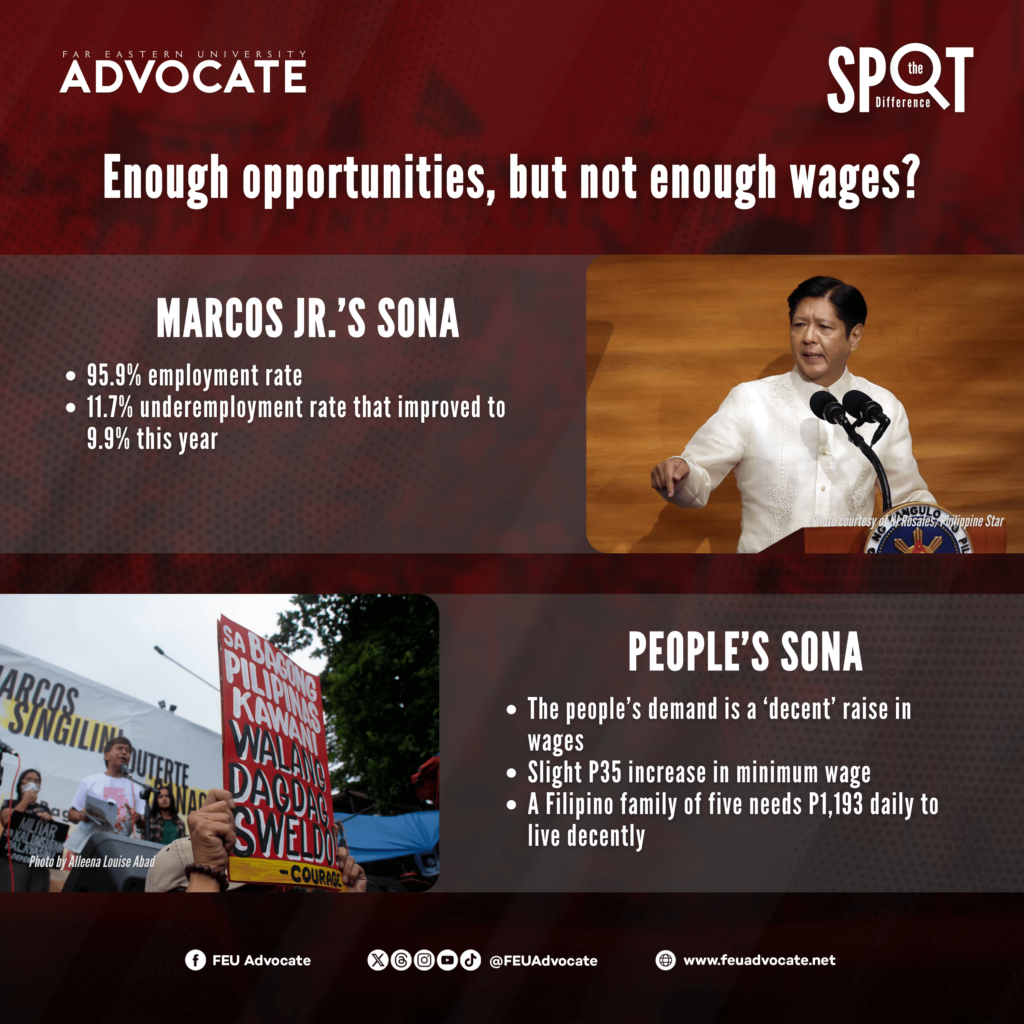
Enough opportunities, but not enough wages?
According to the President’s speech, the country’s employment rate increased to 95.9 percent from 95.7 percent last year while the underemployment rate which was at 11.7 percent in May 2023 decreased to 9.9 percent this year.
“Magagandang balita pa rin ang mga ito, sa kabila ng nararanasang mataas na presyo ng pagkain.” This is what Marcos said regarding the current rate of employment in the country. However, he ignored to detail the recent hike in wage.
What Filipino workers demand from the administration is a ‘decent’ raise in wages that is not only exclusive to the National Capital Region (NCR) aside from job opportunities.
Just this month, the Regional Tripartite Wages and Productivity Board approved the P35 increase in the minimum wage within NCR, which is P115 lower than the National Wage Coalition’s research-based demand.
Prior to its approval, a minimum-wage worker in the country who works for long hours and faces unjust working conditions only earns P610 daily while workers in the agricultural sector take home P573 daily.
As revealed by the IBON Foundation last January, a Filipino family of five needs a monthly income of P25,946 or P1,193 per day to live decently. This shows that the small amount of increase provided by the government is not enough for a Filipino worker to experience a decent living condition.
Moreover, Kilusang Mayo Uno Secretary General Jerome Adonis, stated that the amount of wage increase is an insult to the working class. Sentro ng mga Nagkakaisa at Progresibong Manggagawa also expressed that the increase does not amount to liveable wages given the country’s economic situation.
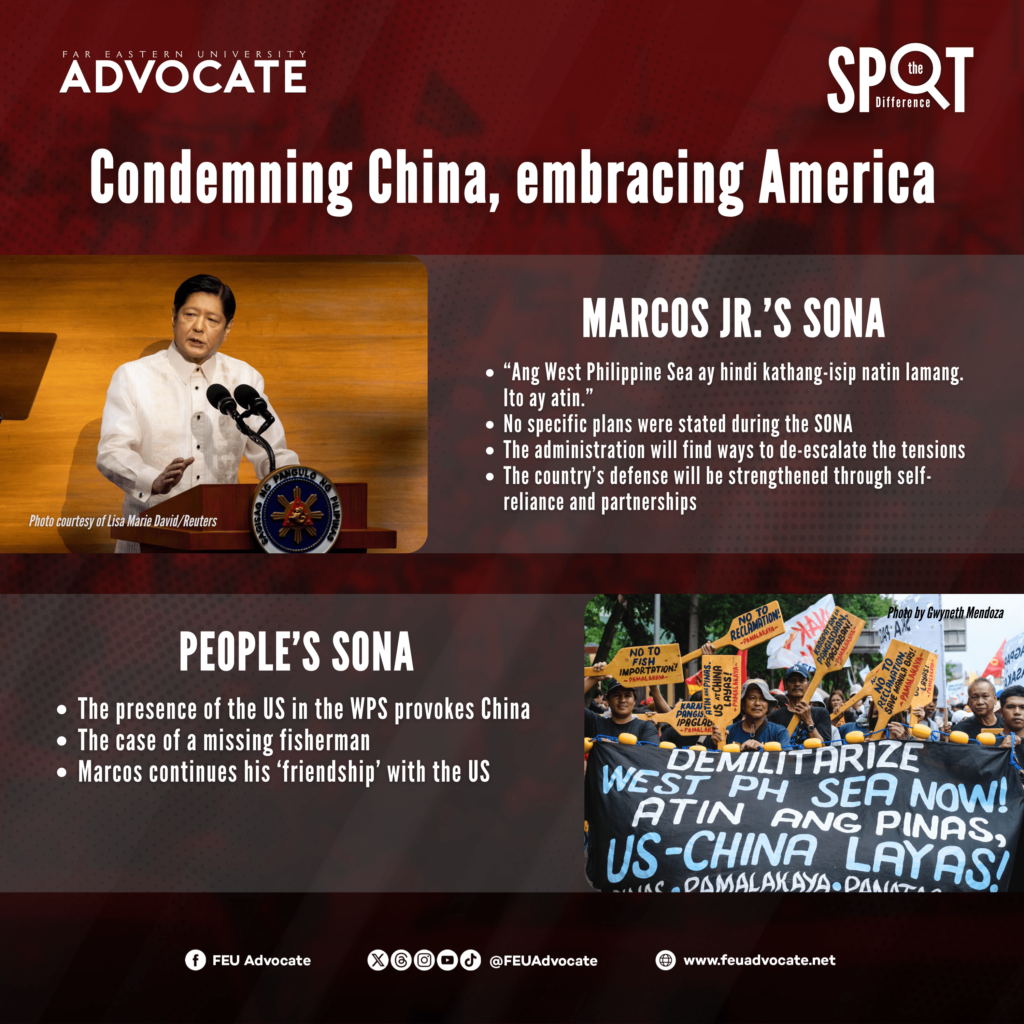
Condemning China, embracing America
The recent territorial disputes in the West Philippine Sea (WPS) raise concerns among many Filipinos. The statement uttered by the President captured the majority of people’s attention regarding the assertion of the country’s ownership of its sea.
“Ang West Philippine Sea ay hindi isang kathang-isip natin lamang. Ito ay atin.” This statement of Marcos received applause and standing ovations during the SONA. However, he did not further share the exact details of his plans regarding the tension in the WPS.
Last April 2024, the President even defended Vice President Sara Duterte’s silence regarding the country’s territorial dispute after receiving criticism from the people for staying unbothered about it. Marcos mentioned that it is not the Vice President’s role to talk about China.
He also added during SONA that the administration will consistently find ways to de-escalate the tensions and will strengthen the country’s defense through self-reliance and partnerships with like-minded states.
The Maritime Zones Act, which would define the maritime areas of the Philippines, as well as the Archipelagic Sea Lanes Law, which will provide the designation of the sea areas and air space that will give passage to foreign vessels and aircraft, remain pending as Marcos stated.
However, PAMALAKAYA Vice Chairperson Ronnel Arambulo expressed how the presence of the United States (US) in the WPS provokes China, causing them to be more aggressive. He also added that the US presents itself as the country’s ally, but also has its interest in the Philippine Sea.
Additionally, the WPS issue was not given a solid solution as recently there was a missing fisherman, and up to this point, there are still no updates about the case.
It is noticeable that under the Marcos administration, the Chinese forces' aggression worsened despite the Permanent Court of Arbitration’s decision that China's nine-dash line claim is invalid based on the United Nations Convention on the Laws of Seas.
Even if the President condemns China’s aggression and stands firm on the country’s ownership of the country’s waters, he still continues his relationship with the US government, which provokes Chinese disputes and harassment against Filipinos.
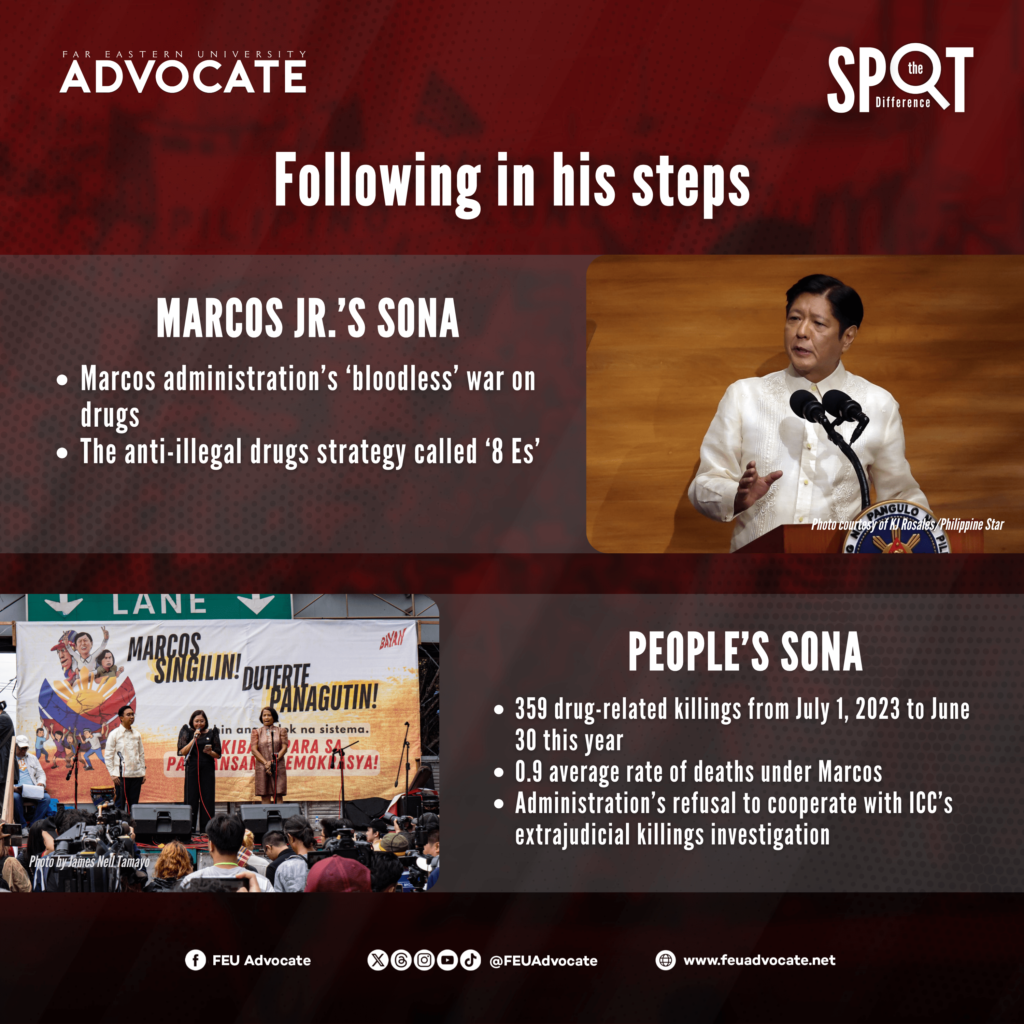
Following in his steps
According to him, the government adhered to its ‘bloodless’ war on drugs and mentioned the ‘8 Es,' which is an anti-illegal drug strategy.
“Our bloodless war on dangerous drugs adheres, and will continue to adhere, to the established ‘8 Es’ of an effective anti-illegal drugs strategy,” Marcos said.
Contrary to what he claimed as a ‘bloodless’ war on drugs, records revealed that drug-related deaths are still being continuously recorded under Marcos Jr.'s administration.
Based on DAHAS PH, a University of the Philippines-based project that tracked drug-related killings in the Philippines, 359 killings were recorded from July 1, 2023 to June 30 this year.
Prior to that record, the tally of drug-related deaths reached 342, and the 0.9 average rate of deaths under Marcos is higher compared to the 0.8 average rate recorded during the last year of Duterte’s term.
Furthermore, Marcos refused to cooperate with the International Criminal Court in investigating the extrajudicial killings that happened during Duterte’s presidential term and even described the investigation as a threat to the country's sovereignty.
During his visit to Germany last March, he even stated that the war on illegal drugs has completely changed, from Duterte’s bloody war to Marcos Jr.’s prevention and rehabilitation-based approach.
However, Marcos’ claims are far different from the records, drug-related killings continue, and an investigation into the extrajudicial killings of the previous administration that will bring hope to the victims’ families is continuously denied.
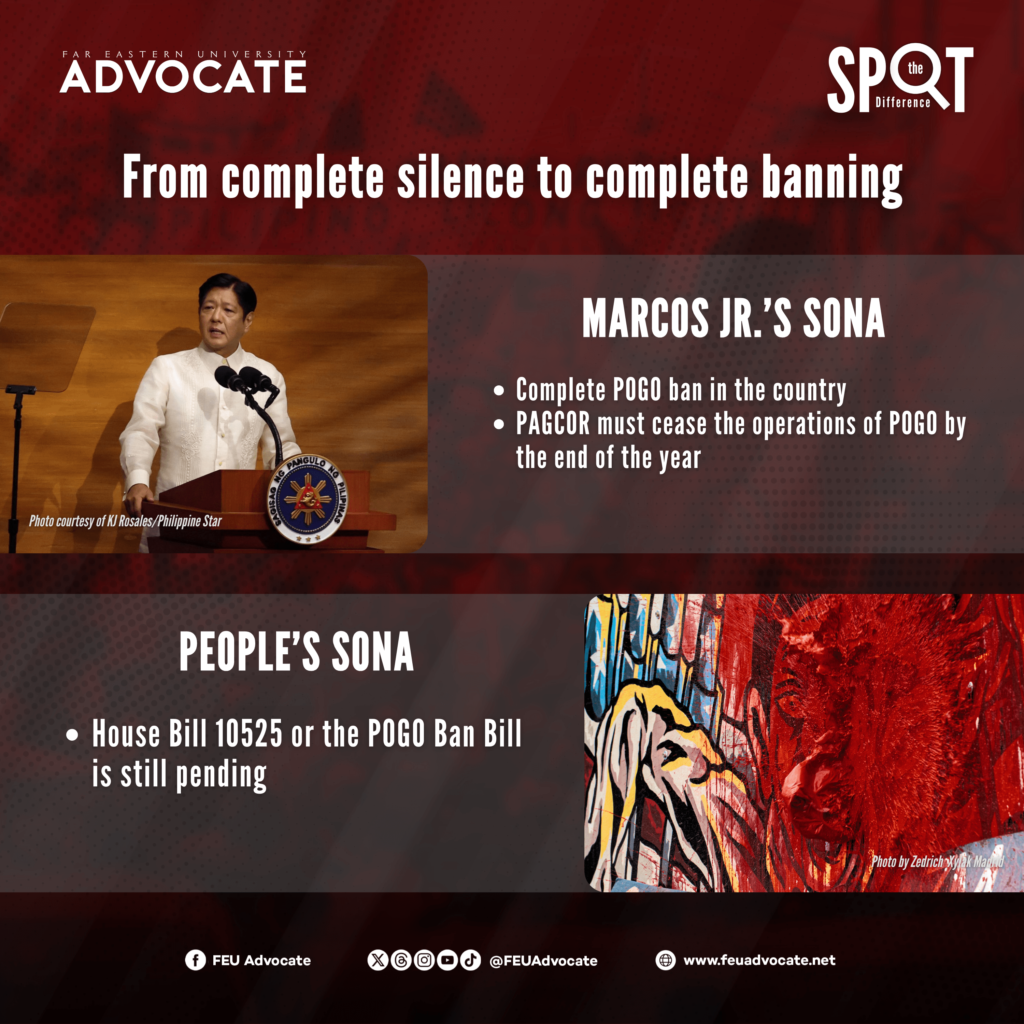
From complete silence to complete banning
Marcos received applause as he imposed the ban of Philippine Offshore Gaming Operators (POGO) in the country. The President instructed the Philippine Amusement and Gaming Corporation (PAGCOR) to cease all POGO operations by the end of the year.
“Kailangan nang itigil ang panggugulo nito sa ating lipunan at paglapastangan sa ating bansa. Effective today, all POGOs are banned,” Marcos said.
During the 2022 national election campaign, Marcos never shared his platforms or stand regarding the POGO operations in the country.
In January 2023, during his seventh month as president, he stated that POGO might not be worth allowing anymore due to the crimes tied to it.
The president also expressed that despite the suggestions of various groups, he is not in a rush to ban POGO within the country.
Senator Risa Hontiveros even demanded Marcos to take his stand and break his silence about the POGO operations in the country, especially during the case of suspended Bamban, Tarlac Mayor Alice Guo, who is allegedly involved in POGO operations in the area.
Marcos Jr. made few remarks about the POGO amid the many calls to ban it and was silent about its presence in the country not until his SONA. The decision of Marcos during his major speech shocked many Filipinos.
The sudden announcement of the POGO ban in the Philippines, expressed by the highest official in the country, is just the first step in achieving the complete ban of POGO operations.
The task ahead for Marcos Jr. is to approve House Bill 10525 or the POGO Ban Bill, to assure the Filipinos that his impactful statement regarding prohibiting this industry is not just an empty promise.
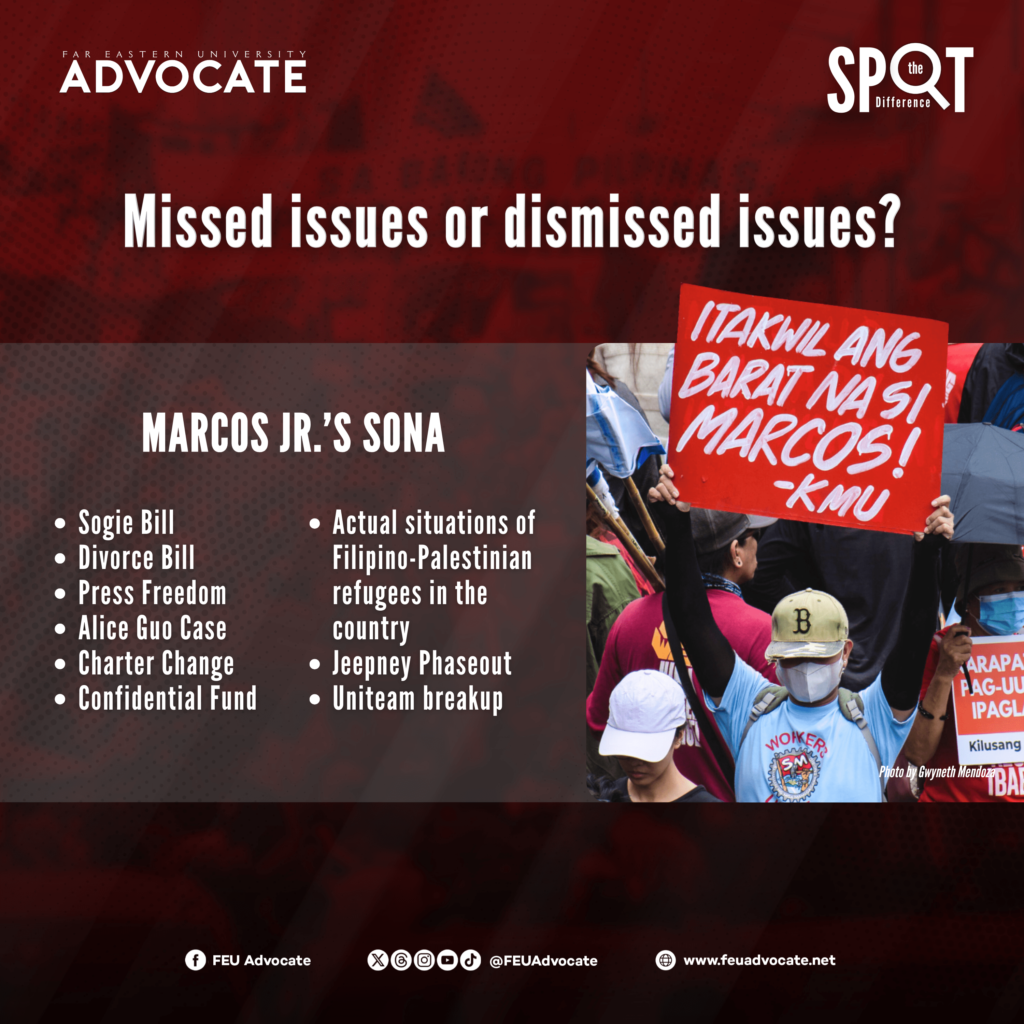
Missed or dismissed issues?
Despite the various topics that sound ‘too good to be true’ mentioned in his speech, several of the Filipinos are disappointed due to the issues that the president failed to discuss.
The high profile bills which are Divorce Bill and the SOGIESC Bill were not mentioned by the President as well as the Charter Change that caused many concerns from the people and triggered an argument between the house and the senate.
For three consecutive SONAs, the President’s address towards the country’s press freedom was not heard. This does not reflect what his administration vowed, which is to support and protect media rights.
Moreover, it seems that he ignored the continuous calls of the people regarding the Public Utility Vehicle Modernization Program. Under his administration, the deadlines set for jeepney drivers were consistently extended, but no solid decision was made by the President.
Issues that are as important as those that were discussed but absent in the president’s SONA, are the controversial confidential fund, the Alice Guo case, and the Filipino-Palestinian refugees.
Marcos profoundly claimed that Filipino-Palestinian refugees were aided and successfully brought back home yet, the real situation of the refugees remained unrecognized as they remained unsettled and stuck in a waiting game.
Furthermore, the recent resignation of Vice President Sara ‘Inday’ Duterte from the president’s cabinet, depicted that there’s no more ‘UniTeam.’
Thus, these issues that the President refuses to discuss only prove that he is like his father, who is a con on displaying the ‘golden era’ during his regime. However, Marcos Jr.’s administration is unlikely to be another golden period because it is an era where unity does not reflect honest governance and true leadership.
On this year's SONA, various predicaments are left unsettled–questions to ponder and regrets on decision making that keep us awake at night. Indeed, after two years of Marcos Jr.’s regime, endless promises and insufficient solutions are depicted in the country. Thus, ‘Bagong Pilipinas’ is not the trademark the country needs but ‘Bangon Pilipinas’ that represents Filipinos, who witness and live the ‘real’ state of the nation.
- Cassandra Luis De Leon and Eunhice Corpuz
(Photos by Zedrich Xylak Madrid, Aleena Louise Abad, Gwyneth Mendoza, James Neil Tamayo/FEU Advocate; Photo courtesy of Yummie Dingding/AFP; Layout by Jonathan Carlos B. Ponio and Phoemalla Jane Balderrama/FEU Advocate)








